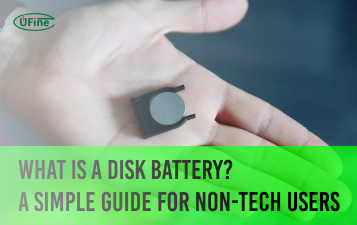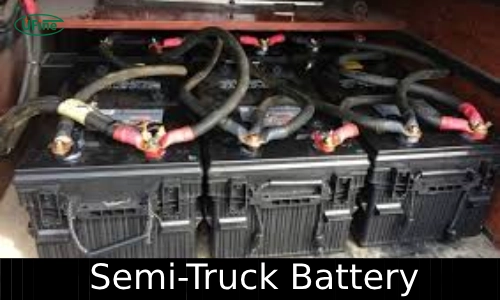Choosing the correct battery for your semi-truck is crucial for a smooth ride. In this article, we’ll guide you through everything you need to know. We’ll start by understanding your truck’s needs and then explore different battery types. Finally, we’ll discuss essential factors to consider and how to take care of your battery.
Part 1. Understanding semi-truck battery requirements
Semi-trucks have unique power needs compared to regular vehicles. They need strong batteries to handle these needs. Here’s why:
Heavy-Duty Nature of Semi-Trucks
1. Starting Power
- Semi-trucks have large engines. They need a lot of power to start.
- A regular car battery doesn’t need to be stronger. Semi-trucks need batteries with higher cold cranking amps (CCA).
2. Accessory Power
- Semi-trucks often have many accessories. These can include lights, GPS systems, and refrigerators.
- These accessories need power even when the engine is off.
- A good battery ensures all these accessories work correctly.
3. Extended Hours on the Road
- Semi-trucks travel long distances.
- Batteries must provide consistent power for long periods.
- They need to be reliable and durable.
4. Frequent Starting and Stopping
- Semi-trucks often start and stop. This happens at loading docks and rest areas.
- Batteries must handle frequent cycling. This means charging and discharging many times.
Electrical Demands
Multiple Batteries
- Semi-trucks often use more than one battery.
- They need this to meet high power demands.
High Capacity
- Batteries need to store a lot of energy.
- This ensures the truck can run all electrical systems without interruption.
Compatibility
- The battery must match the truck’s electrical system. If not, the battery can fail, and the car might not start or work correctly.
Voltage and Amperage
- The battery must have voltage and amperage to fit the truck’s needs. Most semi-trucks use a 12-volt system, but always check what your vehicle requires.
Part 2. Types of batteries for semi-trucks
Starting Batteries
Starting batteries are designed to give a quick, intense burst of power to start your truck’s engine. They use lead-acid technology to produce a lot of current quickly.
- Role: Their main job is to start the engine. Once the engine runs, the alternator powers the truck and recharges the battery.
- Cold Cranking Amps (CCA): A key feature of starting batteries. CCA measures how well the battery can start the engine in cold temperatures. Higher CCA means better performance in cold weather.
- Chemistry: Typically, starting batteries use flooded lead-acid chemistry. They have thin lead plates that provide high power output but do not support deep discharging.
Deep Cycle Batteries
Manufacturers build deep-cycle batteries to provide steady power over a long time. They differ from starting batteries because you can discharge and recharge them many times without damage.
- Role: These batteries are used to power accessories and equipment in your truck when the engine is off. This includes things like lights, radios, and other electronics.
- Use: They are ideal for trucks that need power for long periods without running the engine. This makes them great for overnight stays or long stops.
Chemistry:
- Flooded Lead-Acid: These have thick lead plates and are cost-effective but require regular maintenance.
- AGM (Absorbent Glass Mat): These are sealed and maintenance-free, offering good performance and durability.
- Gel: These are also sealed and maintenance-free, providing good resistance to vibration and temperature extremes.
- Lithium-Ion: These are becoming more popular for deep-cycle applications. They are lightweight, have a longer lifespan, and allow for deeper discharging than lead-acid batteries without damage. They also charge faster and require no maintenance but are more expensive upfront.
Dual Purpose Batteries
Dual-purpose batteries combine the features of starting and deep-cycle batteries. They can provide the power needed to start the engine and deliver steady power over time.
- Role: They are versatile and can handle both starting the engine and powering accessories.
- Benefits: Dual-purpose batteries are beneficial when space or budget is limited. They offer a good balance for trucks that need both functions but don’t want to install two separate batteries.
- Chemistry: Dual-purpose batteries usually use AGM or enhanced flooded lead-acid chemistries. They provide both high power output and deep cycle capabilities.
Choosing the correct type of battery for your semi-truck depends on your specific needs and how you use your truck. Understanding these options helps you make the best choice.
Part 3. Factors to consider when choosing a semi-truck battery
Battery Capacity
Battery capacity, measured in Amp-Hours (Ah), determines how long your battery can provide power.
- Importance: Higher capacity means more power available over a more extended period before needing recharge.
- Determining Appropriate Capacity: Calculate based on your truck’s power demands when idling or with accessories running. More capacity ensures reliable power during long hauls.
Cold Cranking Amps (CCA)
Cold Cranking Amps (CCA) measure a battery’s ability to start an engine in cold temperatures.
- Definition: It indicates the maximum current a battery can deliver at 0°F (-18°C) for 30 seconds without dropping below a specified voltage.
- Choosing the Right CCA: Consider your truck’s climate and engine size. Higher CCA ratings are needed for colder climates and larger engines to ensure reliable starting.
Reserve Capacity (RC)
Reserve Capacity (RC) measures how long a battery can run essential electrical loads if the alternator fails.
- Explanation: It indicates the minutes a fully charged battery at 80°F (27°C) can supply 25 amps before dropping below 10.5 volts.
- Importance: Crucial for trucks relying on electronics during engine-off periods or emergencies.
Durability and Vibration Resistance
Semi-trucks operate in rugged environments with constant vibration and harsh conditions.
- Importance of Durability: Ensure the battery can withstand rough roads and engine vibrations without damage.
- Features for Vibration Resistance: Look for batteries with robust casing and internal components designed to absorb vibrations, reducing the risk of failure.
Maintenance Requirements
Maintenance needs vary between batteries, impacting long-term performance and cost-effectiveness.
- Comparison: Maintenance-free batteries (like AGM or Gel) require no refilling or electrolyte checks, reducing upkeep.
- Impact on Performance: Batteries needing maintenance (like flooded lead-acid) require periodic checks and water refills to ensure optimal performance and lifespan.
Part 4. Maintenance and care for semi-truck batteries
Proper maintenance and care are crucial for ensuring the longevity and performance of semi-truck batteries.
Regular Inspections
- Importance of inspections: Regularly check battery terminals for corrosion and ensure they are clean and securely connected.
- Frequency: Inspect every few months or during routine maintenance checks to catch issues early.
Cleaning and Terminals
- Cleaning process: Use baking soda and water to clean terminals and prevent corrosion buildup.
- Significance: Clean terminals ensure good electrical connections and prevent starting problems.
Monitoring Electrolyte Levels (For Flooded Batteries)
- Process: Add distilled water to check and maintain proper electrolyte levels in flooded batteries.
- Reason: Proper electrolyte levels optimize battery performance and lifespan.
Testing and Charging
- >Regular testing: Use a battery tester to check voltage and charge state.
- Charging practices: Charge batteries entirely after use and avoid deep discharges to extend battery life.
Storage and Temperature Considerations
- Storage guidelines: Store batteries in a cool, dry place away from direct sunlight.
- Temperature impact: Extreme temperatures can affect battery performance; maintain within recommended ranges.
Replacement Timing
- Signs of replacement: Monitor battery age and performance indicators like slow cranking or frequent jump starts.
- Timing: Replace batteries before they fail to avoid downtime and potential damage to other electrical components.
Part 5. FAQs
-
Are semi-truck batteries 12v or 24v?
Semi-truck batteries are typically 12 volts. This voltage is standard across most commercial trucks to power their electrical systems and start the engine. -
Are semi-truck batteries deep cycle?
No, semi-truck batteries are typically not deep-cycle batteries. They provide high-cranking power to start the truck’s engine. Semi-truck batteries prioritize delivering a quick burst of energy to start the engine efficiently rather than providing sustained power over extended periods like deep cycle batteries. -
What is the difference between a semi-truck battery and a car battery?
The main difference lies in their design and purpose. Semi-truck batteries withstand heavy-duty use and vibrations typical of long-haul trucks. They prioritize high starting power (CCA) and durability. Car batteries, while also 12 volts, are designed for smaller engines and lighter loads, focusing more on quick starts and occasional use. -
What is the average life of a semi-truck battery?
The average life of a semi-truck battery ranges from 3 to 5 years under normal operating conditions. Factors such as climate, maintenance practices, and frequency of use can affect battery lifespan. Proper care, including regular inspections and charging, can help extend the battery’s life.
Related Tags:
More Articles

What Is a Disk Battery? A Simple Guide for Non-Tech Users
A disk battery is a small, round cell used in watches, remotes, and other electronic devices. It delivers steady power for compact, low-drain devices.
What Battery Powers a Space Heater?
Discover the type of battery that powers space heaters and learn how to choose the right one for efficient heating in your home or office.
What Is an LR14 Battery? Learn About This C-Size Cell
The LR14 battery, also known as a C battery, delivers steady power. Learn its specs, uses, lifespan, and how it compares to other battery types.
Watch Battery Dimensions Chart: Sizes, Voltages, and Equivalents Explained
Understanding watch battery dimensions helps you choose the right size, voltage, and equivalent model to keep your watch running safely and smoothly.
How Long Can You Rely on Battery-Powered Generators?
Discover battery generator runtime & lifespan factors. Learn how to maximize performance and choose the right power solution.





